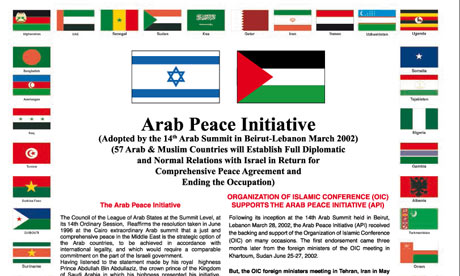
May 24, 2013
What happened to the recent Arab Peace Initiative (API) unanimously endorsed by the 22-member Arab League in 2002 at the Beirut Summit of the Arab League? It is time for Israel to accept the API as a basis for peace negotiations.
The Arab League latest proposed API to Israel states in brief that if Israel ends the occupation of the West Bank, Gaza and East Jerusalem, and allows the Palestinians to build their own state, the Arab world will recognize Israel’s existence and establish normal relations with it. Israel would then be able to exchange ambassadors and trade with all its Arab neighbors. The Arab-Israeli conflict would then be over.
A similar API was rejected by Israel in 2002 because the Arab League had demanded Israel withdraw from all the territories it captured in 1967. This time, the Arabs sweetened the deal, stating that a peace settlement could include modifications to the 1967 borders. This means that Israel could keep many of its West Bank settlements. The Palestinians would be compensated with land from the Israeli side of the border.
In 2007, U.N. General Secretary Ban Ki-Moon urged Israel to restart the peace process based on the API.
In 2009, in a speech at the Brookings Saban Center on Middle East Peace, then Senator John Kerry, (D-Mass.), chairman of the Foreign Relations Committee, re-awakened interest in the API when he remarked, “[the] Arab Peace Initiative has emerged as the basis on which to build a Regional Road Map that enlists moderate Arab nations to play a more active role in peacemaking and to paint a clearer picture than ever before of the rewards peace would bring to all parties.”
Hamas has rejected the API stating, “To those who speak of land swaps we say: Palestine is not a property, it is not for sale, not for a swap and cannot be traded.”
On May 23, 2013, U.S. Secretary of State John Kerry arrived in Jerusalem in an effort to jumpstart Israeli-Palestinian peace negotiation by reintroducing the API as a starting point for a solution to the Arab-Israeli conflict.
Clearly, the ball is now in Israel’s court. Yet, the Israeli government has not officially responded to the latest API. If Israel rejects the latest API, the Arab League will probably continue to ratify the API, even if Israel continues to reject it, because it helps to expose the fact that Israel has no intention of ending the occupation unless it is forced to do so. And unfortunately, the U.S. is unlikely to impose sanctions on Israel or even reduce its foreign aid to Israel in the face of Israel’s intransigence.


 The Hunger Site
The Hunger Site
May 27, 2013 at 2:19 am
Having read the API there are certain things I agree with and certain things I don’t:
I agree with a return to June 4th 1967 borders, except concerning Jerusalem. Jerusalem should be declared an independent city-state administered and policed by the UN.
I disagree with the Palestinian “right of return” to Israeli lands held as of June 4th 1967, especially as the PA has often promised that Jews will be denied entry into the new Palestine. What’s good for the goose is good for the gander, as the saying goes.
I disagree with returning the Golan to Syria. It should either remain in Israeli hands or made an extraterritorial no-man’s land and be declared a permanent DMZ.
The border with Lebanon should remain as it is. I see no reason for change along that front as either ceding or taking of land in that area would do nothing to create a peace with Hezbollah and would in fact only encourage them to further attacks.
I don’t believe in “mutually agreed land-swaps”. Don’t swap the lands, swap the occupants. All Israelis to the west side of the border, all Palestinians to the east of it. Those who choose to remain on the “wrong side” of the border lose their previous citizenship and become residents under the rule of the land, be it Israel or Palestine. In this case destruction of homes and buildings will be considered illegal and no government or government supported agency or business may aid in the destruction of any property except for the destruction of Israeli military and/or intelligence bases within the West Bank whose destruction should be mandatory. The destruction of any civilian (non-intelligence) buildings must provide reparations to the new owners of said property”.